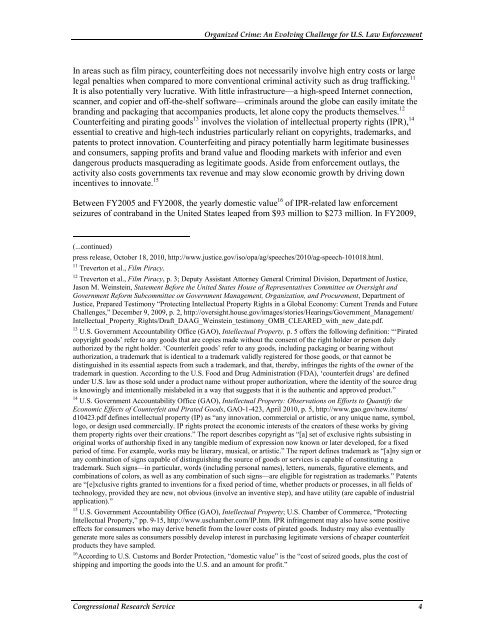Organized Crime In The New Millennium
Organized Crime In The New Millennium
Organized Crime In The New Millennium
Create successful ePaper yourself
Turn your PDF publications into a flip-book with our unique Google optimized e-Paper software.
<strong>Organized</strong> <strong>Crime</strong>: An Evolving Challenge for U.S. Law Enforcement<br />
<strong>In</strong> areas such as film piracy, counterfeiting does not necessarily involve high entry costs or large<br />
legal penalties when compared to more conventional criminal activity such as drug trafficking. 11<br />
It is also potentially very lucrative. With little infrastructure—a high-speed <strong>In</strong>ternet connection,<br />
scanner, and copier and off-the-shelf software—criminals around the globe can easily imitate the<br />
branding and packaging that accompanies products, let alone copy the products themselves. 12<br />
Counterfeiting and pirating goods 13 involves the violation of intellectual property rights (IPR), 14<br />
essential to creative and high-tech industries particularly reliant on copyrights, trademarks, and<br />
patents to protect innovation. Counterfeiting and piracy potentially harm legitimate businesses<br />
and consumers, sapping profits and brand value and flooding markets with inferior and even<br />
dangerous products masquerading as legitimate goods. Aside from enforcement outlays, the<br />
activity also costs governments tax revenue and may slow economic growth by driving down<br />
incentives to innovate. 15<br />
Between FY2005 and FY2008, the yearly domestic value 16 of IPR-related law enforcement<br />
seizures of contraband in the United States leaped from $93 million to $273 million. <strong>In</strong> FY2009,<br />
(...continued)<br />
press release, October 18, 2010, http://www.justice.gov/iso/opa/ag/speeches/2010/ag-speech-101018.html.<br />
11 Treverton et al., Film Piracy.<br />
12 Treverton et al., Film Piracy, p. 3; Deputy Assistant Attorney General Criminal Division, Department of Justice,<br />
Jason M. Weinstein, Statement Before the United States House of Representatives Committee on Oversight and<br />
Government Reform Subcommittee on Government Management, Organization, and Procurement, Department of<br />
Justice, Prepared Testimony “Protecting <strong>In</strong>tellectual Property Rights in a Global Economy: Current Trends and Future<br />
Challenges,” December 9, 2009, p. 2, http://oversight.house.gov/images/stories/Hearings/Government_Management/<br />
<strong>In</strong>tellectual_Property_Rights/Draft_DAAG_Weinstein_testimony_OMB_CLEARED_with_new_date.pdf.<br />
13 U.S. Government Accountability Office (GAO), <strong>In</strong>tellectual Property, p. 5 offers the following definition: “‘Pirated<br />
copyright goods’ refer to any goods that are copies made without the consent of the right holder or person duly<br />
authorized by the right holder. ‘Counterfeit goods’ refer to any goods, including packaging or bearing without<br />
authorization, a trademark that is identical to a trademark validly registered for those goods, or that cannot be<br />
distinguished in its essential aspects from such a trademark, and that, thereby, infringes the rights of the owner of the<br />
trademark in question. According to the U.S. Food and Drug Administration (FDA), ‘counterfeit drugs’ are defined<br />
under U.S. law as those sold under a product name without proper authorization, where the identity of the source drug<br />
is knowingly and intentionally mislabeled in a way that suggests that it is the authentic and approved product.”<br />
14 U.S. Government Accountability Office (GAO), <strong>In</strong>tellectual Property: Observations on Efforts to Quantify the<br />
Economic Effects of Counterfeit and Pirated Goods, GAO-1-423, April 2010, p. 5, http://www.gao.gov/new.items/<br />
d10423.pdf defines intellectual property (IP) as “any innovation, commercial or artistic, or any unique name, symbol,<br />
logo, or design used commercially. IP rights protect the economic interests of the creators of these works by giving<br />
them property rights over their creations.” <strong>The</strong> report describes copyright as “[a] set of exclusive rights subsisting in<br />
original works of authorship fixed in any tangible medium of expression now known or later developed, for a fixed<br />
period of time. For example, works may be literary, musical, or artistic.” <strong>The</strong> report defines trademark as “[a]ny sign or<br />
any combination of signs capable of distinguishing the source of goods or services is capable of constituting a<br />
trademark. Such signs—in particular, words (including personal names), letters, numerals, figurative elements, and<br />
combinations of colors, as well as any combination of such signs—are eligible for registration as trademarks.” Patents<br />
are “[e]xclusive rights granted to inventions for a fixed period of time, whether products or processes, in all fields of<br />
technology, provided they are new, not obvious (involve an inventive step), and have utility (are capable of industrial<br />
application).”<br />
15 U.S. Government Accountability Office (GAO), <strong>In</strong>tellectual Property; U.S. Chamber of Commerce, “Protecting<br />
<strong>In</strong>tellectual Property,” pp. 9-15, http://www.uschamber.com/IP.htm. IPR infringement may also have some positive<br />
effects for consumers who may derive benefit from the lower costs of pirated goods. <strong>In</strong>dustry may also eventually<br />
generate more sales as consumers possibly develop interest in purchasing legitimate versions of cheaper counterfeit<br />
products they have sampled.<br />
16 According to U.S. Customs and Border Protection, “domestic value” is the “cost of seized goods, plus the cost of<br />
shipping and importing the goods into the U.S. and an amount for profit.”<br />
Congressional Research Service 4

















